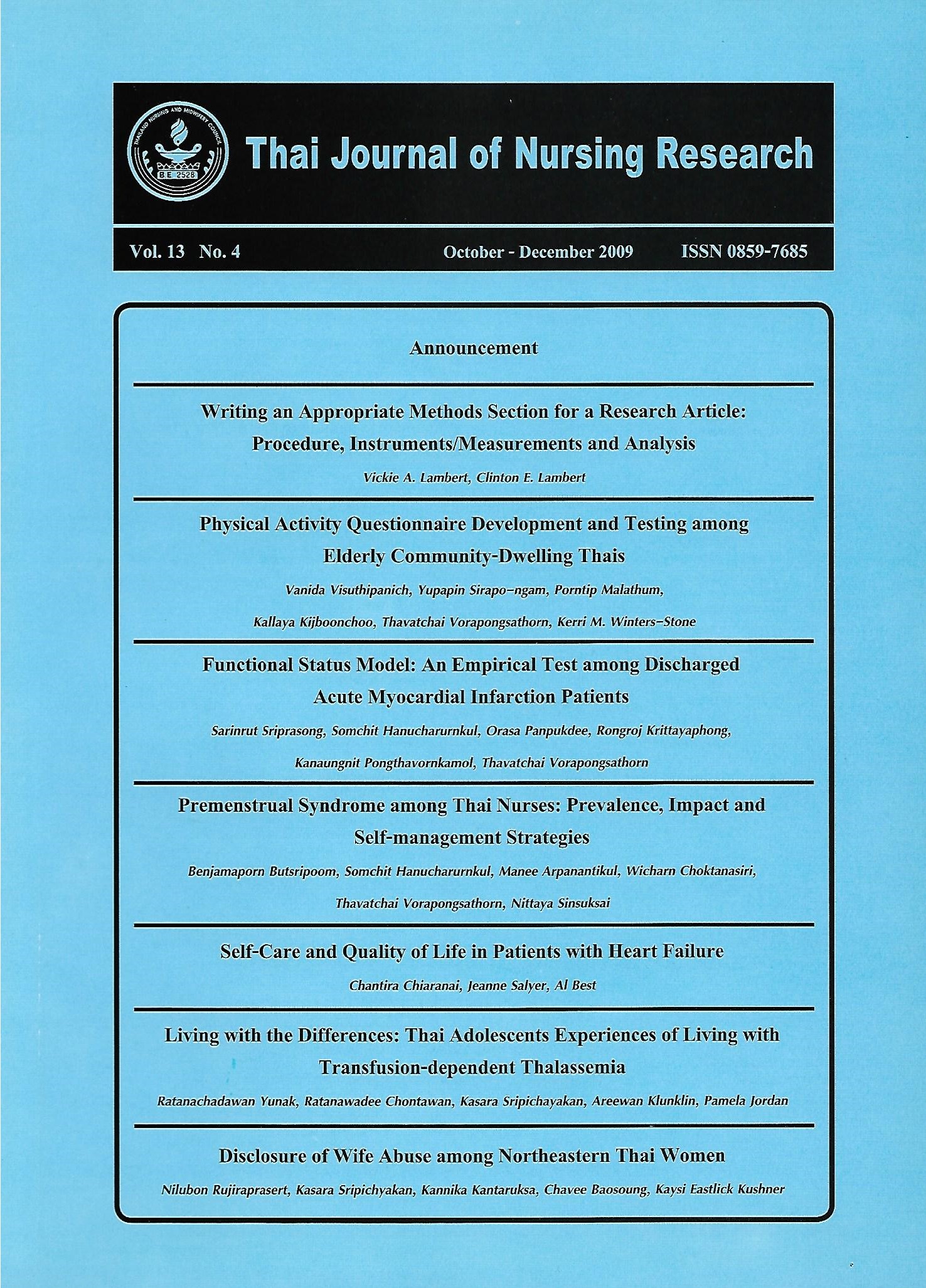Functional Status Model: An Empirical Test among Discharged Acute Myocardial Infarction Patients
Keywords:
กล้ามเนื้อหัวใจตายเฉียบพลัน, แบบจำลองเชิงสาเหตุ, การเตรียมความพร้อมก่อนออกจากโรงพยาบาล, การให้ความหมายเกี่ยวกับโรค, การทำหน้าที่ในกิจวัตรประจำวัน, acute myocardial infarction, causal model, discharge readiness, illness representation, functional statusAbstract
บทคัดย่อ
ภาวะกล้ามเนื้อหัวใจตายเป็นภาวะที่ส่งผลกระทบอย่างมากต่อการทำหน้าที่ในกิจวัตรประจำวันโดยเฉพาะภายใน 1 เดือนแรกหลังผู้ป่วยออกจากโรงพยาบาล การวางแผนฟื้นฟูและช่วยเหลือผู้ป่วยให้กลับสู่การทำหน้าที่ตามกิจวัตรประจำวันได้อย่างเต็มความสามารถของแต่ละคนเป็นเรื่องที่ซับซ้อน และยังไม่ชัดเจน การศึกษาครั้งนี้มีวัตถุประสงค์เพื่อศึกษาความสัมพันธ์เชิงสาเหตุระหว่างความพร้อมก่อนออกจากโรงพยาบาล การให้ความหมายเกี่ยวกับโรค การเผชิญปัญหา และ อาการซึมเศร้า ที่มีผลต่อการทำหน้าที่ในกิจวัตรประจำวันของผู้ป่วยกล้ามเนื้อหัวใจตายภายหลังออกจากโรงพยาบาล
กลุ่มตัวอย่างเป็นผู้ป่วยกล้ามเนื้อหัวใจตาย จำนวน 180 คน ที่มารับการรักษาในโรงพยาบาล 5 แห่งในกรุงเทพมหานครและจังหวัดนนทบุรี กลุ่มตัวอย่างทำการตอบแบบสอบถามรวม 5 ชุด ในระยะก่อนออกจากโรงพยาบาล และระยะหลังออกจากโรงพยาบาลแล้ว 1 เดือน ผลการศึกษาพบว่า การให้ความหมายเกี่ยวกับโรค(โดยผู้ป่วย) การเผชิญปัญหา และ อาการซึมเศร้าสามารถทำนายความแปรปรวนของการหน้าที่ในกิจวัตรประจำวันได้ 56% รูปแบบจำลองสุดท้ายที่ปรับแก้มีความสอดคล้องกับข้อมูลเชิงประจักษ์
จากการศึกษาครั้งนี้ ถึงแม้การให้ความหมายเกี่ยวกับโรค การเผชิญปัญหา อาการซึมเศร้า จะมีอิทธิพลทั้งโดยตรงและโดยอ้อมต่อการทำหน้าที่ในกิจวัตรประจำวัน แต่ ความพร้อมก่อนออกจากโรงพยาบาลมีอิทธิพลมากที่สุด ดังนั้น บุคลากรในทีมสุขภาพ ควรเน้นถึงการเตรียมผู้ป่วยให้พร้อมก่อนออกจากโรงพยาบาล
คำสำคัญ: กล้ามเนื้อหัวใจตายเฉียบพลัน แบบจำลองเชิงสาเหตุ การเตรียมความพร้อมก่อนออกจากโรงพยาบาล การให้ความหมายเกี่ยวกับโรค การทำหน้าที่ในกิจวัตรประจำวัน
Abstract
Functional status is known to be adversely affected by an acute myocardial infarction (AMI), especially the first month after the event. Problems involved in restoration of the highest possible functional status level are complex and not well understood. To better understand these issues, the aim of this study was to test, one month post-hospitalization, the effects of discharge readiness, cognitive and emotional illness representation, problem- and emotion-focused coping and depressive symptoms on functional status of individuals who had experienced an AMI.
A sample of 180 post-AMI patients were recruited from five hospitals located in Bangkok and Nonthaburi Province. Participants completed two questionnaires, on the day of discharge, and three questionnaires, one month after discharge. The final model fit the data well, and explained 56% of the variance in functional status of the AMI patients.
Although illness representation, coping and depressive symptoms influenced the functional status of those who had experienced an AMI, discharge readiness was found to be the most influential predictor of functional status. Recommendations center on the importance of preparing AMI patients for discharge.
Keywords : acute myocardial infarction, causal model, discharge readiness, illness representation, functional status
Downloads
How to Cite
Issue
Section
License
Copyright: The Pacific Rim International Journal of Nursing Research, Thailand Nursing & Midwifery Council has exclusive rights to publish, reproduce and distribute the manuscript and all contents therein.








.png)



